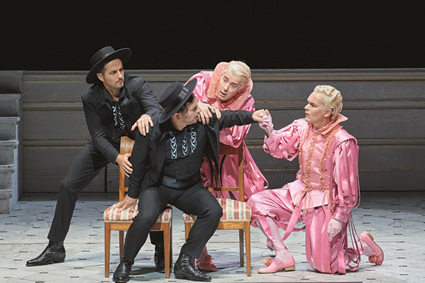| Opera Reviews | 26 April 2024 |
Hans Neuenfels' Entführung offers Singspiel with slapstickby Moore Parker |
|
| Mozart: Die Entführung aus dem Serail Vienna State Opera 26 October 2020 |
|

Daniel Behle (Belmonte), Michael Laurenz (Pedrillo), Ensemble
|
|
|
Arguably revolutionary twenty two years ago when first presented in Stuttgart, Hans Neuenfels’ famous - or infamous - Die Entführung aus dem Serail now becomes the German Regietheater prophet’s Vienna State Opera debut, at age 79. The singing leads are complimented by identically costumed actors who independently communicate as well as interact with their twins - differentiating on various levels with augmented texts, at times hinting at prisms of alter egos and emotions - and with some oddly-banal interchanges. In one instance, Belmonte 1 advises Belmonte 2 who, in turn, thanks Belmonte 1…all tritely by name, etc.,etc. Later, for example, Blonde (the singing version) mentions her English heritage - while including references to Queen Victoria, Winston Churchill and Miss Marple. The additional figures are often given abundant activity while their doubles are singing, at times distracting (rather than augmenting) visually - and more significantly, audibly. Singspiel goes slapstick! A one-set stage-in-stage (Christian Schmidt) provides variety in altitude and access with a raised proscenium to the rear, and the entirety atmospherically enhanced by Stefan Bolliger’s subtle lighting. Bettina Merz was responsible for the colourful potpourri of costumes. Konstanze is a truly daunting challenge which Lisette Oropesa largely conquered with her appealing warm-timbred lyric soprano (oddly hinting at colours and the idiosyncratic vibrato of the exceptional German mezzo, Brigitte Fassbaender) and equally becoming stage craft. Her three contrasting arias brought a combination of fine lyricism, excellent trills and some fine scale work - all only slightly marred by somewhat vague diction and an occasional unevenness in line. As a “package” of an artist suited to his part and fulfilling its demands, Daniel Behle’s handsome Belmonte shone with his Mozartian approach, impeccable style, and a sheer polish which prevailed throughout the evening. Goran Jurić is a curious choice as Osmin. With the role lying even lower than Sarastro in passages (low D’s are required in “O wie will ich triumphieren”), a true bass in range and colour is clearly demanded by Mozart’s score. Jurić’s vocal attributes unquestionably lie in a higher segment of the bass clef, but his showing was bombastically energetic and was keenly contrasted (unlike the other lead couples) by his alter ego (Andreas Grötzinger) who was athletically lithe and slender - while sporting a heinous Mackie Messer air. As Blonde, Regula Mühlemann was also a little out of her depth with her light - but sweet-toned - soprano not ideally matching the part’s demands, while nevertheless scoring moments of charm as the evening progressed. Michael Laurenz fared respectably as Pedrillo, shaping his contrasting arias well and making much of his relationship with his “partner” in crime. Bassa Selim appears first cloaked in a dark overcoat and face-wrapped scarf, to progress to a golden tunic, and then to black tie for the finale. Irrespective of garb, Christian Nickel failed to truly transport any sense of command in presence or dispatch, with the character appearing generally morose and depressed for much of the action. Antonello Manacorda opened with a captivating overture with the State Opera Orchestra vivid and transparent - and while the visuals of stage activity tended to dominate the evening, the Italian conductor nevertheless maintained course with fine co-ordination and pit-to-stage balance throughout. Ultimately, a production more of novelty historic interest than newfound artistic revelation - but one Mozart himself might have found fun. |
|
| Text ©
Moore Parker Photo © Wiener Staatsoper / Michael Pöhn |
|







